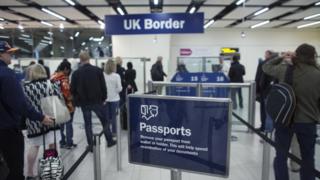 Image copyright
Image copyright
Getty Images
Theresa May will warn EU leaders that public safety will suffer if they allow “political doctrine and ideology” to hamper post-Brexit security arrangements.
The prime minister will say she wants a new partnership of unprecedented “depth and breadth” when the UK leaves the EU.
In a speech to the Munich Security Conference she will urge countries to show “real political will”.
New security arrangements have yet to be negotiated for after Brexit.
During talks with Angela Merkel on Friday, Mrs May said both sides need to be “bold and ambitious” in framing their future relations.
The German chancellor said that while the UK could not replicate its existing membership outside the EU, she wanted relations to be “as close as possible”.
EU member states currently work closely in the fight against organised crime and terrorism.
- Merkel ‘curious’ about UK’s Brexit aims
- UK reveals proposed EU security deal
- European spy chiefs in Brexit joint plea
Key initiatives include the European Arrest Warrant – under which suspects can be speedily extradited between member states – Europol, the EU intelligence agency, and the Schengen Information System of real-time alerts about suspects.
‘Ideology’
The UK says that while the legal framework for its membership of these arrangements will end when it leaves the EU in March 2019, it wants to draw up new working arrangements – which ministers have described as being “as close to the status quo as possible”.
Image copyright
AFP
Mrs Merkel said she was “curious not frustrated” about the UK’s approach
In her speech on Saturday, Mrs May will point to the arrest of suspected terrorists and operations against people traffickers as examples of the benefits of cooperation across borders.
And she will warn other EU countries not to let “ideology” get in the way of a deal.
“This cannot be a time when any of us allow competition between partners, rigid institutional restrictions or deep-seated ideology to inhibit our co-operation and jeopardise the security of our citizens,” she will say.
“We must do whatever is most practical and pragmatic in ensuring our collective security.”
Analysis: Vicki Young, chief political correspondent
Theresa May has spent months calling for a deep and special economic partnership with the EU after Brexit and now her focus turns to security.
Again she’s asking for a unique arrangement.
Britain will be outside the EU, a “third” country, and it would be unprecedented for the current close cooperation to continue. But the thrust of the British government’s argument is that we should be a special case.
The UK is offering its substantial resources (the second largest defence budget in NATO) and expertise in counter terrorism. The prime minister wants a treaty to enshrine what Downing Street describes as the real, tangible benefits of cooperation, and failure to sign up will play into the hands of our enemies who’d like nothing more than to see Europe divided.
Her warning to EU leaders is blunt. Don’t let your deep seated ideology put Europe’s citizens in danger.
Mrs May has consistently said that she won’t use security as a bargaining chip, that her offer is “unconditional” but that’s no guarantee that the EU would simply accept a request from the UK to continue to be a part of Europol or the European Arrest Warrant.
Her hope is that the EU takes a practical, pragmatic approach because they accept that continuing to work together is mutually beneficial.
‘Real world consequences’
There is no current example of the sort of security agreement the UK is seeking with the EU, Mrs May will say.
But she will say the sort of arrangements reached with other countries in areas like trade could be replicated.
“However, if the priority in the negotiations becomes avoiding any kind of new co-operation with a country outside the EU, then this political doctrine and ideology will have damaging real world consequences for the security of all our people, in the UK and the EU,” she will say.
“As leaders, we cannot let that happen.”
Earlier this year the outgoing head of Europol, Rob Wainwright, told the BBC Brexit would mean the UK losing influence on cross-border policing and security work.
“We will find other ways of influencing, more informal ways, but they will be less direct, less pronounced and probably less successful than they are now,” he said.
Mrs May’s speech is one of a series dubbed “the road to Brexit” with her government under pressure to set out in detail what it wants life outside the EU to look like.
Theresa May warns EU not to block post-Brexit security deal}

